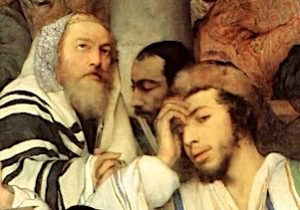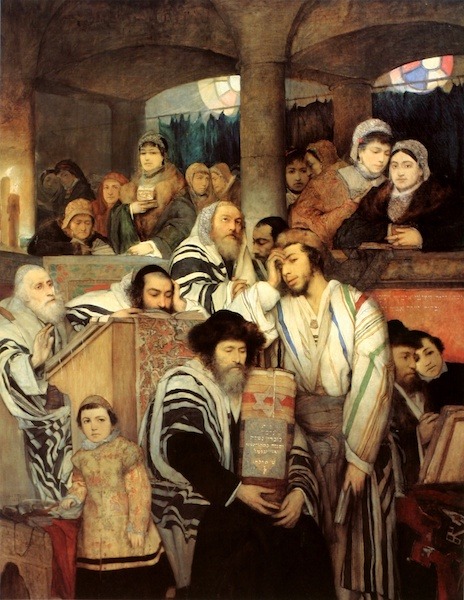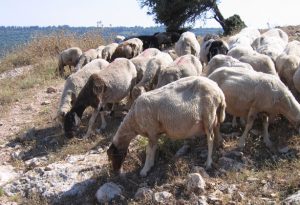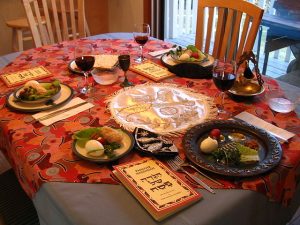by Lois Tverberg
 Yom Kippur, the Day of Atonement, is the holiest and most important day of the year for Jews. It begins before sunset the night fore, and includes a 25 hour fast from both food and water, and ceasing of all work. It is a day set aside to “afflict the soul,” to ask for atonement for the sins of the past year. Even Jews who otherwise are not observant will observe this day.
Yom Kippur, the Day of Atonement, is the holiest and most important day of the year for Jews. It begins before sunset the night fore, and includes a 25 hour fast from both food and water, and ceasing of all work. It is a day set aside to “afflict the soul,” to ask for atonement for the sins of the past year. Even Jews who otherwise are not observant will observe this day.
Yom Kippur comes after the ten “Days of Awe” when people are to examine themselves and repent of their sins. They also go to each other to confess and be forgiven, because they believe God calls us first to make things right with each other before being right with him. Some people wear a kittel, the white robe in which the dead are buried. That is a reminder that our lives are finite here, and we should be prepared to stand before the Lord the day we die.
The holiday was instituted in Leviticus 16, where it says:
“This shall be a permanent statute for you: in the seventh month, on the tenth day of the month, you shall humble your souls and not do any work, whether the native, or the alien who sojourns among you; for it is on this day that atonement shall be made for you to cleanse you; you will be clean from all your sins before the LORD. “It is to be a sabbath of solemn rest for you, that you may humble your souls; it is a permanent statute. (Lev. 16:29-31)
 The traditions of the day are rich and moving. When the temple was standing, special sacrifices were offered, and the high priest laid the sins of the nation on a scapegoat that was driven into the wilderness and killed there.
The traditions of the day are rich and moving. When the temple was standing, special sacrifices were offered, and the high priest laid the sins of the nation on a scapegoat that was driven into the wilderness and killed there.
Among the ultra-orthodox, some still lay their sins on the head of a chicken that is then sacrificed, and the meat given to the poor. Throughout the ages, there has been a clear understanding of the need for a means of atonement, even after the Temple was destroyed and the decision was made that prayers alone were sufficient.
To Christians, we see the obvious need for the atonement that comes from the death and resurrection of Christ. Indeed, it is appropriate to remember God’s answer for our sins as the Jewish people celebrate Yom Kippur.
In our personal Bible study group in years past, we have observed this day with the liturgy below. It was written for Christian believers, but with many traditional elements of the services in the synagogue. It reminds us of our need for our atoning Messiah, and our forgiveness in Him. We have found it very meaningful to say it together, and thought you would be blessed through it too.
Yom Kippur Liturgy
Almighty King, seated upon Your throne of compassion,
You are gracious to Your people,
Pardoning sinners and forgiving transgressors,
And You deal generously with all human beings
Not treating them according to their wickedness.
Oh God, You who revealed Your character to Moses on Mount Sinai,
Remember in our favor Your thirteen attributes of mercy, as it is written:
The LORD descended in the cloud and stood there with Moses,
And proclaimed the name, “The Lord.”
The Lord passed before him, and proclaimed,
The LORD, the LORD,
a God merciful and gracious, slow to anger,
and abounding in steadfast love and faithfulness,
keeping steadfast love for thousands of generations,
forgiving iniquity, transgression and sin,
and clearing those who repent.
Adonai, Adonai, El rachun v’chanun,
Erech a-pa-yim, ve rav chesed ve-emet
No-tsayr chesed la-alafim
No-say avon va-fesha, va-cha-ta-ah, ve-na-kay.
Our God and God of our fathers! Let our prayers come before You, and do not hide Yourself from our supplication. What shall we say to You who dwell on high? You know all things, both hidden and revealed. You search our hearts and thoughts. Nothing is hidden from Your sight. We are not so arrogant nor hardened to say, “We are righteous and have not sinned.”
For truly we have sinned. We have turned away from the good commandments You have given us. You are righteous and true in all Your ways, but we have done evil in Your sight. Thank You our God and God of our fathers, that You forgive all our sins, pardon all our iniquities, and grant atonement for all our transgressions through Yeshua the Messiah.
For it is written: If we confess our sins, He is faithful and just to forgive us our sins and to cleanse us from all unrighteousness. Return, O Israel to the Lord your God, for you have stumbled because of your iniquity. Take words with you and return to the Lord. Say to Him, “Take away all iniquity, and receive us graciously, that we may present the fruit of our lips.”
(It is traditional to gently thump your closed fist against your chest in remorse as you recite the following liturgy:)
For the sin we committed in Your sight by sinning willfully,
and for the sin we committed in ignorance.
For the sin we committed in Your sight rebelliously,
and for the sin we committed through weakness.
For the sin we committed in Your sight by slander,
and for the sin we committed through gossip.
For the sin we committed in Your sight by lustful thoughts,
and for the sin we committed by impure actions.
For the sin we committed in Your sight by speaking idly,
and for the sin we committed by speaking cruelly.
For the sin we committed in Your sight by not being merciful,
and for the sin we committed by withholding when we could have given.
For the sin we committed in Your sight by not loving our neighbors,
and for the sin we committed by not praying for our enemies.
For the sin we committed in Your sight knowingly,
and for the sin we committed unknowingly.
For all these, O God of forgiveness, forgive us, pardon us,
and grant us atonement, in Yeshua the Messiah.
For the sin we committed in Your sight by loving the things in the world,
and for the sin we committed by worshipping idols.
For the sin we committed in Your sight by dishonoring parents,
and for the sin we committed by disregarding children.
For the sin we committed in Your sight by preoccupation with wealth,
and for the sin we committed by coveting possessions.
For the sin we committed in Your sight by unbelief,
and for the sin we committed by disregarding your word.
For the sin we committed in Your sight by failing to pray,
and for the sin we committed by failing to love.
For the sin we committed in your sight by neglecting the poor,
and for the sin we committed by lack of generosity.
For the sin we committed in Your sight by failing to forgive,
and for the sin we committed of hardness of heart.
For the sin we committed in Your sight by not seeking first your kingdom,
and for the sin we committed through pleasing ourselves first.
For all these, O God of forgiveness, forgive us, pardon us,
and grant us atonement, in Yeshua the Messiah.
Our God and God of our fathers,
forgive us, pardon us and grant us atonement.
For we are your people, and you are our God.
We are your children, and you are our Father.
We are your servants, and you are our Lord.
We are your community, and you are our Portion.
We are your heritage, and you are our Lot.
We are your flock, and you are our Shepherd.
We are your vineyard, and you are our Keeper.
We are your work, and you are our Maker.
We are your companions, and you are our Beloved.
We are your treasure, and you are our Friend.
We are your people, and you are our King.
Forgive us, pardon us, and grant us atonement, in Yeshua the Messiah.
Se-lach la-nu, me-chal la-nu, ka-per la-nu
May Your great Name be magnified and sanctified throughout the world
Which You created according to Your will.
May You establish Your kingdom in our lifetime and during our days,
and within the life of the entire house of Israel.
Amen!

~~~~
For the traditional Ashkenazi Jewish liturgy that is used on Yom Kippur, see this link.
Photos: Maurycy Gottlieb [Public domain], Dušan Smetana on Unsplash



